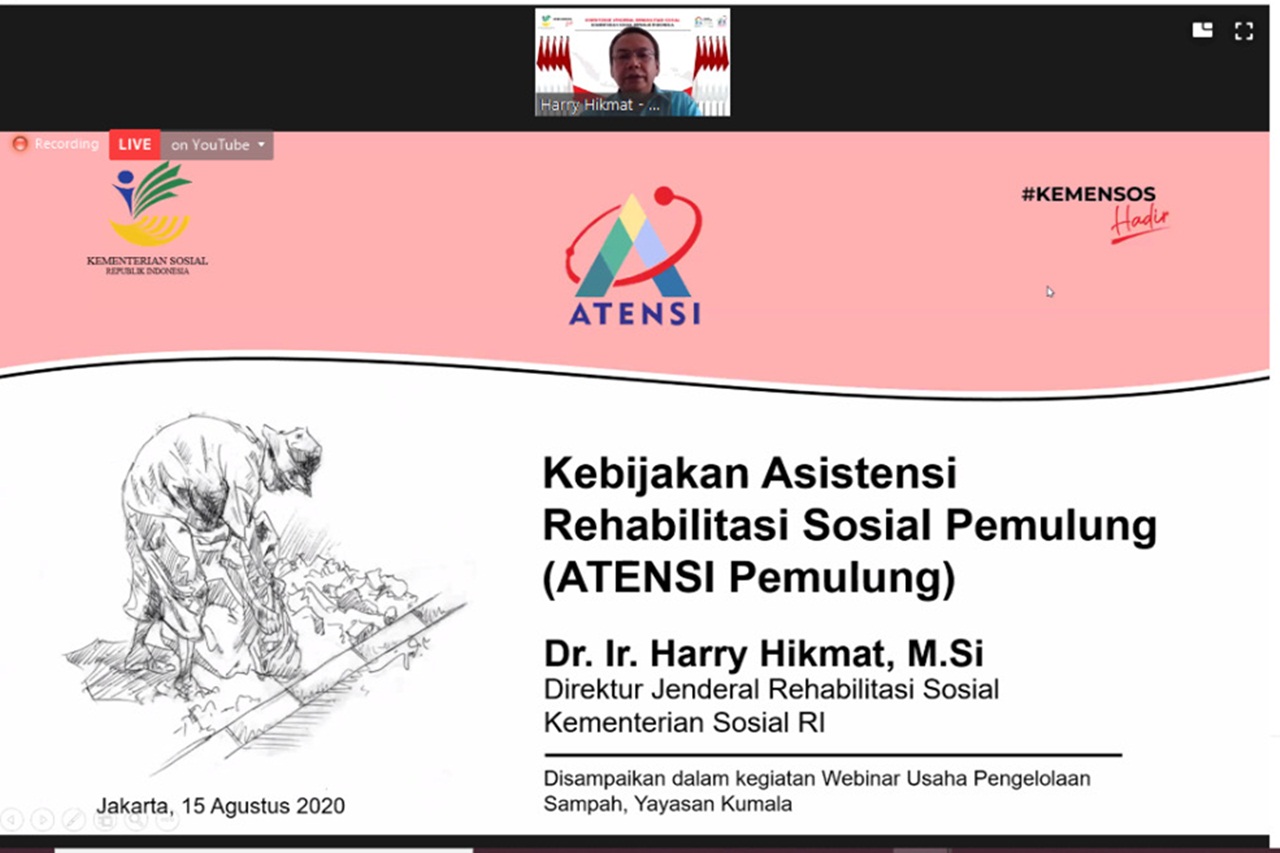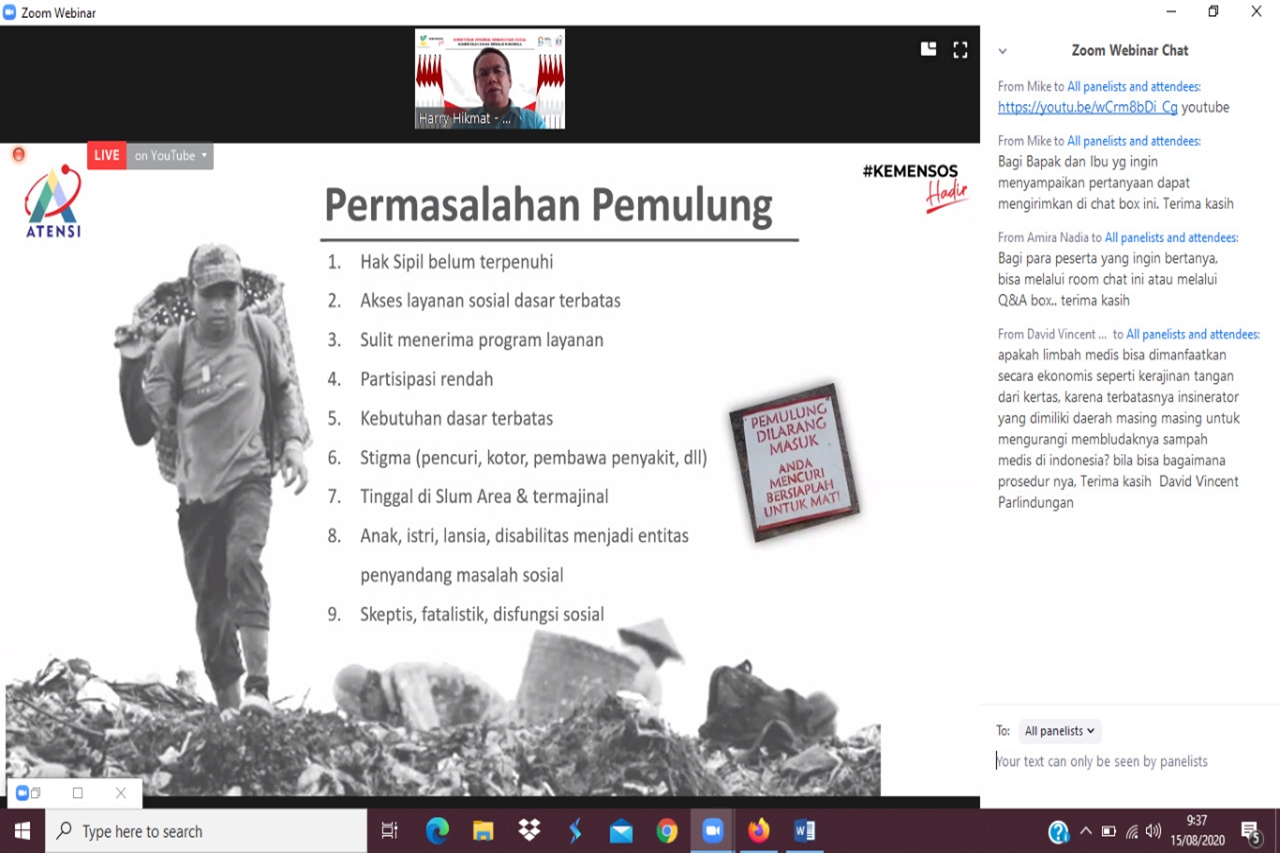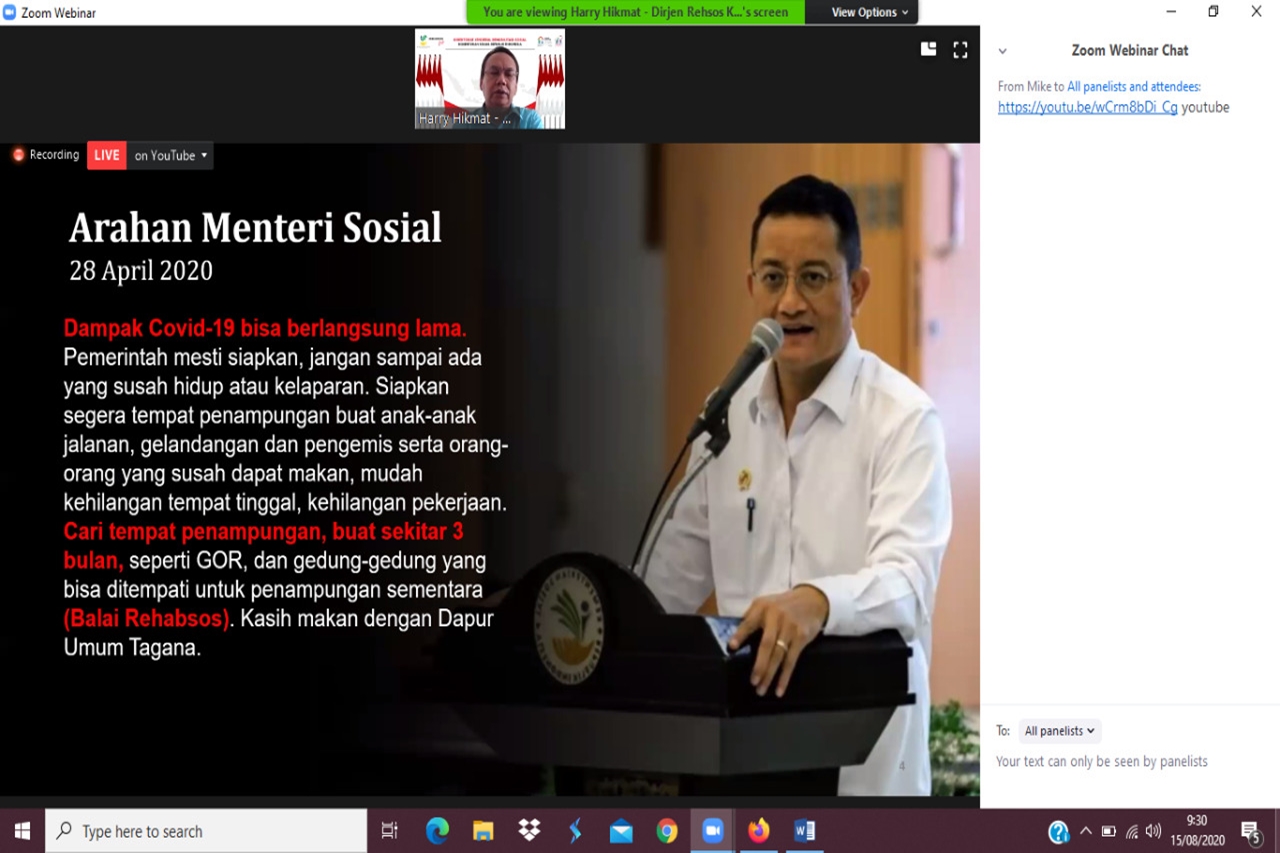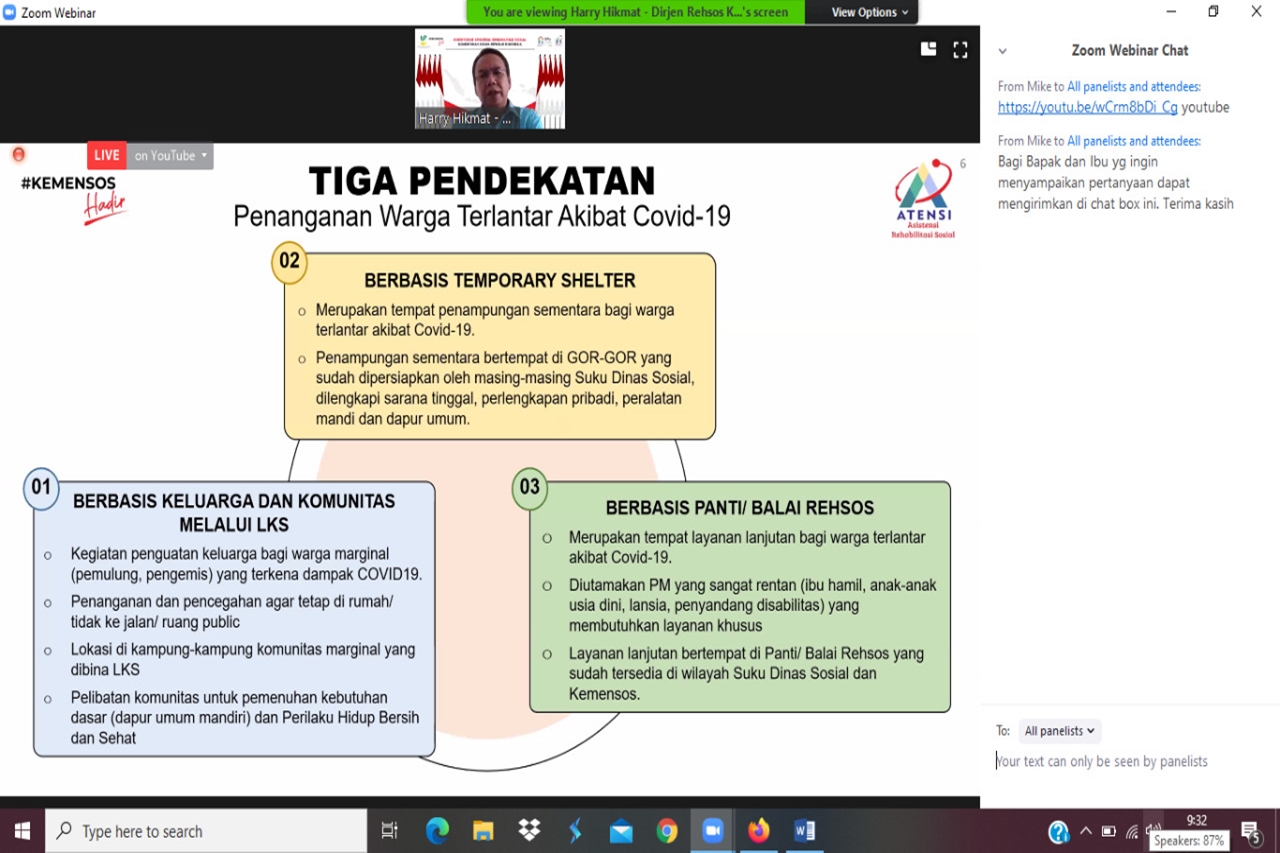JAKARTA (August 15, 2020) - The Director General of Social Rehabilitation of the Ministry of Social Affairs of the Republic of Indonesia, Harry Hikmat was a resource person in the webinar "Waste: Blessing in the Time of the COVID-19 Pandemic" Alternative Waste Management Business during the COVID-19 pandemic. He shared the Ministry of Social Affairs’ thoughts and breakthroughs in the Implementation of Social Rehabilitation Assistance (ATENSI) for Scavengers.
The ATENSI policy for scavengers is related to the COVID-19 trend, which is still increasing. This causes the impact that occurs is also still ongoing, namely there are still displaced people who need serious treatment.
"The Ministry of Social Affairs made a breakthrough in the form of ATENSI for scavengers as an effort to reduce the risk of the impact of the COVID-19 pandemic in DKI Jakarta and Bekasi. This effort was carried out in collaboration with 12 Community Welfare Institutions (LKS), one of which was the Kumala Foundation LKS," said the Director General of Social Rehabilitation.
Initially, the Indonesian Minister of Social Affairs, Juliari P. Batubara, gave directions that there should be serious efforts in handling displaced residents due to COVID-19, from beggars, homeless people, scavengers, homeless people to layoff victims. Don't let people have trouble living and starve.
The Ministry of Social Affairs through the Directorate General of Social Affairs has created a Program for Handling Displaced Residents Due to COVID-19 (PWTC), one of which is the dominant group affected by scavengers and their families. This handling is carried out through three approaches, namely family-based, community-based and residential-based.
Under these conditions, the Ministry of Social Affairs ensures that there are temporary shelters for displaced residents, namely the provision of 5 Sports Centers (GOR) in collaboration with the DKI Jakarta Provincial Social Service, Assistance for families in the community by 12 LKS, and further social rehabilitation in 5 Centers for Social Rehabilitation of the UPT Ministry of Social Affairs and 2 Social Rehabilitation Centers of UPT Regional Government of DKI Jakarta
A family and community based approaches are the main strategy to prevent scavengers from being in public spaces. Through the provision of independent public kitchens and various rehabilitation activities for social empowerment, the Ministry of Social Affairs in collaboration with LKS and Local Governments has succeeded in providing reinforcement in families and preventing/limiting them from going out during the Large-Scale Social Restrictions (PSBB). This is shown by the fewer displaced residents who are "picked up" by the Social Service Polic Unit to the Temporary Shelter at Sports Center.
From March to August 2020 there were 6,015 displaced residents who have been handled by the Ministry of Social Affairs and Social Services together with LKS. The number consists of 2,836 people in the GOR, 2,781 people in the LKS community and 398 people in the Social Rehabilitation Center and Social Institutions.
The results of the analysis of the residents' data that were handled, the majority (about 70%) were scavengers. Therefore, further handling was developed the Social Rehabilitation Assistance (ATENSI) program for scavengers. The condition of scavengers during the COVID-19 pandemic showed that they were prone to hunger, difficult to get social assistance (because generally they were not residents of DKI/Bekasi ID cards and family cards), lived in slum areas/banks of garbage dumps, tended to be skeptical and fatalistic, and were powerless to face the risk of Covid-19 pandemic.
On the other hand, scavengers are heroes in waste management, illegal janitors, recyclers (reuse, reduce and recycle), unemployment safety valves and are part of a profitable waste recycling business.
LKS Kumala together with other LKS who are the founders of the Waste Bank as well as partners of the Ministry of Social Affairs know and feel the difficult conditions of the scavengers. Even during the visit of the Director General of Social Rehabilitation to several scavenger communities, one of the statements that the Director General of Social Rehabilitation remembered.
"One of the scavengers once said that if we don't pick up trash, we will starve to death. We have two choices, we die because we stay at home or die because of COVID-19 out there," said the Director General of Social Rehabilitation. The statement was made by one of the scavengers when the Large-Scale Social Restrictions (PSBB) were implemented.
So the Ministry of Social Affairs together with LKS continues to strive to provide ATENSI for scavengers, starting from meeting basic needs (food assistance and independent kitchens), providing psychological social therapy including education on health protocols and rapid tests health, ensuring social care by families for children, the elderly and disabled. , facilitating productive economic business skills training to other family support.
The Director General of Social Rehabilitation continued that waste recycling management has its own mechanism. The chain starts from scavengers, sellers, collectors, suppliers, factories to return to the community in the form of useful goods. "This is an extraordinary business process, so this mechanism requires in-depth research, especially the benefits of waste management for the welfare of scavengers," said the Director General of Social Rehabilitation.
The research on the economic system that takes place on scavengers is needed to restore the scavengers' socio-economic rights. Because based on the visit of the Director General of Social Rehabilitation to several collectors and waste processing factories, there is a high price gap between prices at the level of scavengers and prices at the level of collectors, suppliers, and even factories.
The application of ATENSI for scavengers is to reach prosperous scavengers. Starting from providing legal status as a Cleansing Movement Cadre (KPK), getting assistance for social rehabilitation and social entrepreneurship, increasing participation, eliminating stigma, guaranteeing basic rights and needs to providing access to basic services.
In the future, scavengers will also be sought to receive other government programs such as the Joint Business Group (KUBE) for recycling waste, Social Entrepreneurship Programs and basic Social Assistance (KIP, KIS, PKH, Sembako/BPNT and RTLH). For this reason, the registration of the scavengers and their families continues. Some of them have received social safety net programs such as basic food assistance from the Ministry of Social Affairs.
"An important point that was conveyed by the Minister of Social Affairs was assisting scavengers not only to ensure changes in attitude, mentality and behavior, but there must be further efforts, both in the form of sustainable social assistance and access to social empowerment programs," concluded the Director General of Social Rehabilitation.
The activity organized by LKS Kumala was attended online by 177 general participants as well as social and environmental activists from all over Indonesia. In addition, the keynote speaker, namely the CSR Manager of PT. Donggi - Senoro LNG who conveyed the experience of the CSR program in empowering scavengers through LKS.
Other resource persons who are competent in their fields, namely the Director General of Social Rehabilitation of the Ministry of Social Affairs, the Secretary of the Directorate General of Pollution and Environmental Damage Control, the Ministry of Environment and Forestry of the Republic of Indonesia, the Chairman of the Kumala Foundation, the Chief Commercial Officer of Live Mana and the Co-Founder of Garis Kebun were also presented in this activity. This is one of the efforts to build a social network for the social welfare of scavengers.
 English
English
 Bahasa
Bahasa




